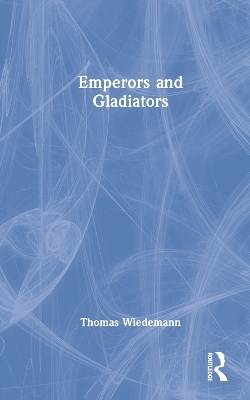
Emperors and Gladiators
Seiten
1992
Routledge (Verlag)
978-0-415-00005-5 (ISBN)
Routledge (Verlag)
978-0-415-00005-5 (ISBN)
Wiedemann presents an original and comprehensive study of the changing significance of gladiatoral contests to Roman culture.
Of all aspects of Roman culture, the gladiatorial contests for which the Romans built their amphitheatres are at once the most fascinating and the most difficult for us to come to terms with. They have been seen variously as sacrifices to the gods or, at funerals, to the souls of the deceased; as a mechanism for introducing young Romans to the horrors of fighting; and as a direct substitute for warfare after the imposition of peace.
In this original and authoritative study, Thomas Wiedemann argues that gladiators were part of the mythical struggle of order and civilisation against the forces of nature, barbarism and law breaking, representing the possibility of a return to new life from the point of death; that Christian Romans rejected gladiatorial games not on humanitarian grounds, but because they were a rival representation of a possible resurrection.
Of all aspects of Roman culture, the gladiatorial contests for which the Romans built their amphitheatres are at once the most fascinating and the most difficult for us to come to terms with. They have been seen variously as sacrifices to the gods or, at funerals, to the souls of the deceased; as a mechanism for introducing young Romans to the horrors of fighting; and as a direct substitute for warfare after the imposition of peace.
In this original and authoritative study, Thomas Wiedemann argues that gladiators were part of the mythical struggle of order and civilisation against the forces of nature, barbarism and law breaking, representing the possibility of a return to new life from the point of death; that Christian Romans rejected gladiatorial games not on humanitarian grounds, but because they were a rival representation of a possible resurrection.
Dr. Tracey Ryan-Morgan is a HCPC Registered Consultant Clinical Neuropsychologist, an Associate Fellow and Chartered Member of the British Psychological Society as well as a Chartered Scientist, a Regional Fellow of the Royal Society of Medicine and listed on the Specialist Register of Clinical Neuropsychologists. She has worked in the NHS, Charity and Independent sectors. Tracey has consulting rooms in Wales and London.
Introduction List of Illustrations Dates Abbreviations 1. Gladiators and Roman Identity 2. The Context 3. The Gladiators: Background and Status 4. Opposition and Abolition? 5. Conclusion: Imperial Sovereignty and Popular Sovereignty Bibliography Glossary
| Erscheint lt. Verlag | 10.5.2019 |
|---|---|
| Verlagsort | London |
| Sprache | englisch |
| Maße | 138 x 216 mm |
| Gewicht | 362 g |
| Themenwelt | Geschichte ► Allgemeine Geschichte ► Vor- und Frühgeschichte |
| Geschichte ► Allgemeine Geschichte ► Altertum / Antike | |
| Geisteswissenschaften ► Geschichte ► Regional- / Ländergeschichte | |
| Sozialwissenschaften ► Ethnologie | |
| Sozialwissenschaften ► Soziologie | |
| ISBN-10 | 0-415-00005-X / 041500005X |
| ISBN-13 | 978-0-415-00005-5 / 9780415000055 |
| Zustand | Neuware |
| Haben Sie eine Frage zum Produkt? |
Mehr entdecken
aus dem Bereich
aus dem Bereich
auf den Spuren der frühen Zivilisationen
Buch | Hardcover (2023)
C.H.Beck (Verlag)
CHF 27,95
Konzepte – Methoden – Theorien
Buch | Softcover (2024)
UTB (Verlag)
CHF 55,85
Was Pompeji über uns erzählt
Buch | Hardcover (2023)
Propyläen (Verlag)
CHF 44,75


